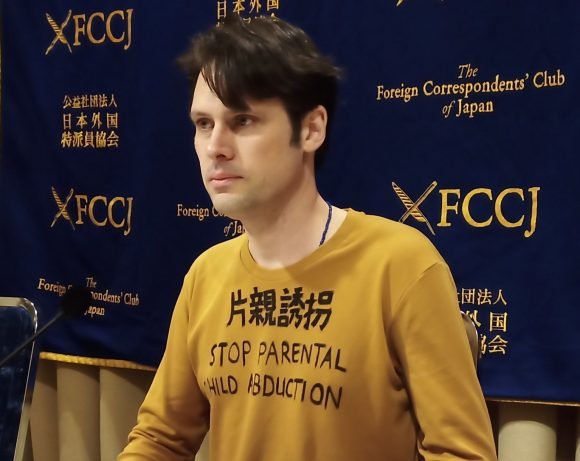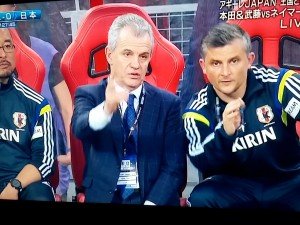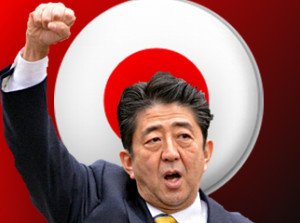
Right-wing and revisionist politicians Yoshiko Matsuura and Tomoko Tsujimura
By Fred Varcoe
It was nice to see the Foreign Correspondents’ Club of Japan invite two right-wing politicians to the Club to express their views on the “comfort women.” Tokyo-based politicians Yoshiko Matsuura and Tomoko Tsujimura demonstrated how the right think in Japan. Or, to put it another way, how the right is incapable of thought.
Matsuura and Tsujimura arrived to explain how they travelled to Glendale, Calif., to protest at a statue of a “comfort woman” being erected in a public park. The protest was accompanied by a letter – from the Japan Coalition of Legislators against Fabricated History, which was signed by hundreds of legislators – to Glendale Mayor Dave Weaver explaining why they were protesting.
Here are some excerpts and comments:
1. “We are committed to instilling a fair-minded, accurate perception of history in our children.”
A noble idea that has never been part of the Japanese mentality. Japan has consistently denied crimes committed in the past – as it denies truths that it doesn’t want made public. They constantly denied Unit 731 existed in China until incontrovertible evidence emerged. Sweep everything under the carpet is their modus operandi. If we can’t see it, it didn’t exist. It is ironic that the many signees to the letter to Mayor Weaver portrayed the message of the statue as a “distorted view of history.”
2. “Japanese military authorities never forced Korean women to engage in prostitution. The comfort women were part of a legally sanctioned prostitution system, similar to others in existence throughout the world. They were handsomely remunerated; the word ‘sex slaves’ is an inaccurate description of the comfort women.”
It is quite possible that real prostitutes from Japan, Korea and other countries sought to make money from Japanese soldiers. The right wing in Japan often cites an American Army report from Burma that suggested that some girls they came across were professionals (i.e., prostitutes) and making a good living. But no one outside Japan has suggested that this single report exonerated Japan over this issue or that this represented the true, broader picture of what was going on in Japanese military brothels.
3. “Also engraved on the statue is the following: ‘In memory of more than 200,000 Asian and Dutch women who were removed from their homes in Korea, China, Taiwan, Japan, the Philippines, Thailand, Vietnam, Malaysia, East Timor and Indonesia, to be coerced into sexual slavery by the Imperial Armed Forces of Japan between 1923 and 1945.’ However, the Japanese military never abducted women or compelled them to serve as comfort women.”
The speakers and other right-wingers in Japan claim that the Japanese military never abducted women. And they absolve themselves entirely by blaming recruitment on local agents. This is to some extent true, but there is little doubt that the agents were working on behalf of the military and the military was fully complicit in these crimes against humanity. Whatever the chain of command may have been, the women were conned into working for Japanese military brothels. If they had been independent prostitutes, as the Japanese imply, then they would have been free to go where they wanted and fuck who they wanted. But they were typical examples of human traffic, conned into believing they would be properly employed (e.g., in a factory) and reimbursed. The traffickers then imposed an artificial debt on them – typical of today’s traffickers – which they had to work off by being raped by Japanese soldiers (up to 40 a day). The vast majority of these women were not free, certainly were not prostitutes and definitely didn’t want to be where they were. They were enslaved and, let’s be quite clear, they may have been recruited by “agents” (and there is evidence of military complicity) but they were slaves of the Japanese armed forces. Lack of freedom = slavery.
4. “Japan is a nation whose culture places great value on women, as evidenced by the fact that works about romantic love created by women writers such as Murasaki Shikibu.”
Anyone who has lived in Japan for any length of time knows that Japanese women are far from being equal with men:
From the Asahi Shimbun:
“October 26, 2013
Japan’s ranking for female equality has fallen a further four places from 101st in 2012 to 105th this year, according to the newly released 2013 Global Gender Gap Report, ranking women’s equality in 136 countries.
The ranking is Japan’s lowest since the World Economic Forum started releasing its annual report in 2006.
The report, released on Oct. 25, said that Japan is failing to have women more involved in society despite their achieving a high education level.”
Murasaki, of course, created the “Tale of Genji,” a book that is revered in Japan but is basically about a paedophile rapist…
- 5. “The Japanese Government-General of Korea prosecuted and punished deceitful brokers at every opportunity. But neither government nor military entities were involved in any way whatsoever in recruiting the comfort women.”
Another copout. I don’t think the Government-General of Korea did a very effective job of prosecuting and punishing deceitful brokers. More to the point, if this was the case, why were the women recruited not sent home if the Government-General of Korea was aware they’d been tricked into serving in the brothels? The inescapable fact is that the Japanese military wanted the women in the brothels, didn’t care how they got there and would keep them there no matter what their recruitment involved.
*************************
I had a simple question for these women at the FCCJ. It was this:
“Were Koreans forced to work in the mines in Oita?”
They refused to answer the question. At first, they said they were only there to talk about comfort women before rambling on about how Koreans and Japanese were working together to win the war, which I thought showed they had a sense of humor before realising that they weren’t joking.
But the question had a purpose. My Korean father-in-law was forced to work in the mines in Oita during the war. Mr. Lee was a noble man of unimpeachable integrity. His admission was not a trick to get money from Japanese companies or the Japanese government. In fact, it was a painful memory for him and one he only shared with his family a few years before he died.
So I wanted to know what Matsuura and Tsujimura thought about Korean workers in Kyushu. Were Koreans like Mr. Lee forced to work down the mine. Their reluctance to answer spoke volumes.
If they believed (and I’m sure they did) that Koreans were forced to work down the mines in Kyushu, then it shouldn’t be a surprise if women were forced to work in brothels for the military. If they had said Koreans weren’t forced to work down the mines, then they were calling my father-in-law a liar. I know he wasn’t. So for me, their arguments have zero validity.
In fact, they were asked how many Koreans they had spoken to about this issue and the answer was none. Tsujimura, proudly related how she had spoken to her military grandfather about the war but failed to tell us how many Korean “prostitutes” he had slept with.
*************************
Tsujimura also tried to suggest that Japan had “civilised” and modernised Korea during its occupation, with one of her arguments being that the number of children being born rose dramatically during that time. Again, she failed to understand why.
My mother-in-law married my father-in-law at a young age, as did many other Korean women, at a time when North Korean agents were kidnapping residents of the South, especially young women. The young women of the South saw marriage as a form of protection against the marauding insurgents from the North, and it is likely that women in colonial times in Korea sought similar protection, as outlined in this quote:
“The Korean cult of female virginity which strictly enforced the norm of girls’ premarital chastity, unwittingly served as an important contributing factor in rendering Korean unmarried women desirable recruits in the eyes of the Japanese authorities. Indeed, Aso Tetsuo (1910-1989), an army doctor, concluded in his report – written after his medical examinations of the women – that unmarried Korean women, rather than Japanese prostitutes, would make better ‘gifts for the Emperor’s warriors.’ The indigenous sexual culture, with its emphasis on what I call ‘virginal femininity,’ thus helped render colonial Korea a prime source of young ‘virgins’ to satisfy the needs of the Japanese military comfort system.” – from The Comfort Women: Sexual Violence and Postcolonial Memory in Korea and Japan by C. Sarah Soh.
So you can see, being an unmarried girl/woman in colonial Korea made you a target.
According to Soh’s book, Japanese historian Yoshimi Yoshiaki found six official documents in the Library of the National Institute for Defense Studies that “clearly implicate the Japanese government in the establishment and maintenance of the military comfort system.”
One of the disturbing aspects of the FCCJ press conference was how Matsuura and Tsujimura sought to turn the issue around as a Korean attack on Japanese. While the statue in Glendale was erected largely at the behest of Koreans, it represents the sex slaves of many nationalities. Tsujimura claimed that Japanese schoolchildren were being bullied by Korean kids in California and asserted that this amounted to “racial discrimination.” Being a historical dunce, she is obviously unaware that the Japanese and Koreans are the same race. More to the point is the fact that Dutch, Australian and many Asian women were victims of the comfort women system. It is not just about Korea and Japan. Jan Ruff-O’Herne is one of those former sex slaves who has spoken out on the issue. Like others, she didn’t want to revisit the past, but Japan’s denials re. the Korean comfort women forced her to speak out 50 years later.

Jan Ruff-O’Herne
”First it was only the Korean women, and nobody took any notice because ‘they were only Asian women’. But then when a European woman spoke out the world suddenly took notice,” Mrs Ruff-O’Herne said.
*************************
Another constant factor in this debate is the issue of apologies. In 1993, Chief Cabinet Secretary Yohei Kono issued a statement that many see as an apology by the government of Japan for the comfort women issue:
“The Government of Japan has been conducting a study on the issue of wartime “comfort women” since December 1991. I wish to announce the findings as a result of that study.
As a result of the study which indicates that comfort stations were operated in extensive areas for long periods, it is apparent that there existed a great number of comfort women. Comfort stations were operated in response to the request of the military authorities of the day. The then Japanese military was, directly or indirectly, involved in the establishment and management of the comfort stations and the transfer of comfort women. The recruitment of the comfort women was conducted mainly by private recruiters who acted in response to the request of the military. The Government study has revealed that in many cases they were recruited against their own will, through coaxing coercion, etc., and that, at times, administrative/military personnel directly took part in the recruitments. They lived in misery at comfort stations under a coercive atmosphere.
As to the origin of those comfort women who were transferred to the war areas, excluding those from Japan, those from the Korean Peninsula accounted for a large part. The Korean Peninsula was under Japanese rule in those days, and their recruitment, transfer, control, etc., were conducted generally against their will, through coaxing, coercion, etc.
Undeniably, this was an act, with the involvement of the military authorities of the day, that severely injured the honor and dignity of many women. The Government of Japan would like to take this opportunity once again to extend its sincere apologies and remorse to all those, irrespective of place of origin, who suffered immeasurable pain and incurable physical and psychological wounds as comfort women.
It is incumbent upon us, the Government of Japan, to continue to consider seriously, while listening to the views of learned circles, how best we can express this sentiment.
We shall face squarely the historical facts as described above instead of evading them, and take them to heart as lessons of history. We hereby reiterated our firm determination never to repeat the same mistake by forever engraving such issues in our memories through the study and teaching of history.
As actions have been brought to court in Japan and interests have been shown in this issue outside Japan, the Government of Japan shall continue to pay full attention to this matter, including private researched related thereto.”
A number of prime ministers and politicians have issued apologies, although they are often vaguely phrased to allow Japan to squirm out of direct responsibility.
The closest the Emperor came was this statement to South Korean Prime Minister Kim Dae Jung in 1996:
“There was a period when our nation brought to bear great sufferings upon the people of the Korean Peninsula. The deep sorrow that I feel over this will never be forgotten.”
Under the premiership of idiotic revionist Shinzo Abe, there have been calls for Japan to amend the 1993 Kono statement, suggesting there may be doubt about the testimony of Korean women that the statement was based on. And here lies a problem, namely that Japanese politicians are inherently duplicitous and unreliable, so any statements they make are without value.

Japanese protesters show what they think of Prime Minister Shinzo Abe
The only person who could put an end to the issue would be the Emperor, but he is constrained in his statements by the revisionist politicians and conservative bureaucrats that run Japan.
*************************
Japan also points out that all issues concerning the war were resolved when the two countries normalized relations and “settled” all outstanding wartime issues. But this was an agreement between a right-wing Japanese government and the South Korean government of military dictator Park Chung-Hee. Park was a proud servant of the Japanese colonial rulers, joined the (Japanese) Manchukuo Army and, according to a report in the Hankyoreh newspaper, even signed an oath of allegiance to Japan in his own blood.
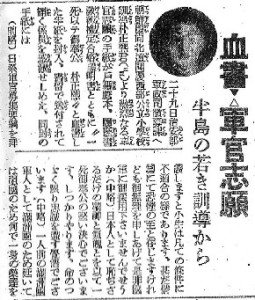
Report on Park Chung Hee pledging allegiance to Japan in his own blood
The 1965 treaty was a diplomatic agreement that rode roughshod over the human problems created by Japan’s past. It was about business and money, not about human suffering or individuals. Technically, the two countries resolved their differences and established diplomatic relations, but this is a human issue and the humans involved are still suffering.
This was brought home to me several years ago when I visited England with my Japanese girlfriend. We arranged to visit my friend Debi at her parents’ house. When Debi’s father heard a Japanese was coming to his house – a cute, lovely and kind Japanese – he walked out and refused to return until the Japanese had gone. He had been a prisoner of war of the Japanese in Singapore and the mere thought of hearing Japanese or being in the same room as a Japanese filled him with painful memories.
For him, it was a reminder of the hate and violence he experienced at the hands of the Japanese. The comfort women are reminded of that hate every day not only through their own experiences, but also through the persistent attempts by Japan to deny that such atrocities ever took place. Would Matsuura and Tsujimura call Debi’s father a liar, like they do my father-in-law?
Probably, especially if he was Korean…
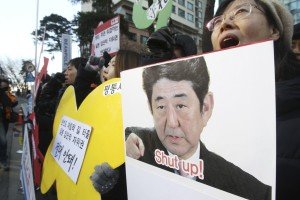
Korean demonstrators offer advice to Japanese Prime Minister Shinzo Abe
*************************
Links:
Park Chung Hee signs oath to Japan in blood
Unit 731
Excerpt from book on comfort women (Google books)
Comfort women article
Japan PM denies coercion re. comfort women
Australian ‘comfort woman’ slams Japan
Comfort women article by Suvendri Kikuchi

